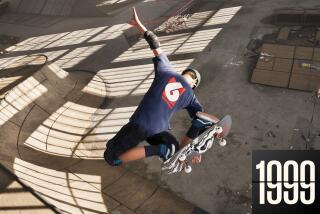Computer Game Soundtracks in Search of Respect
- Share via
Forget the simplistic bleeps of classic video games. When today’s players sit down with their joysticks, they’re listening to hip-hop tunes, bluesy guitar rock and even the warm strains of Beethoven’s “Moonlight Sonata.”
That’s why musician Chance Thomas believes soundtracks for computer games deserve the same respect as scores for feature films.
“We need to have a Grammy for game music,” said Thomas, a senior music producer for Sierra On-Line Inc. in Northern California. “Teenagers realize game music is a booming industry. It’s time everyone else did too.”
To further promote their work, Thomas and several of his peers have submitted a proposal to create a “best interactive music” category for the Academy of Recording Arts and Sciences.
Their bid notes how the genre has changed since the 1980s, when game music languished as software companies focused more on visual flash and less on aural moods. Even the devices used to play the games limited musicians’ creativity: The original Nintendo and Atari machines used chips that generated only simple tones.
As the field matured, the processor tucked inside the game machines became more powerful, as did the capability of sound cards. Suddenly, rich digital sound was possible.
“It’s not just how good the music sounds, but how well it works with the game,” said Charles Deenen, audio director for Irvine-based Interplay Entertainment Corp. “If the academy can see this music as a soundtrack, it should be applicable.”
The academy, which already recognizes 95 categories during its awards ceremony, said it receives about 60 requests for new awards each year.
Although academy officials turned down the proposal earlier this month, they insist Thomas’ idea has promise.
“We’d like to find a way to make this work. But there needs to be something unique about game music, something other than the visual impact,” said Michael Greene, president and chief executive of the academy. “Right now, this is just a young niche market.”
The genre may still be a novelty in the United States, but it has mass appeal in other countries. In Japan, record stores devote entire sections to game music. The software division at Sega routinely releases stand-alone audio CDs with various tracks used in a game. And instead of one soundtrack, game developers often release three or four versions of the same tunes, but interpreted in different musical styles: techno, classical, jazz, rock and blues.
*
P.J. Huffstutter covers high technology for The Times. She can be reached at (714) 966-7830 and at p.j.huffstutter@latimes.com.
More to Read
The biggest entertainment stories
Get our big stories about Hollywood, film, television, music, arts, culture and more right in your inbox as soon as they publish.
You may occasionally receive promotional content from the Los Angeles Times.










